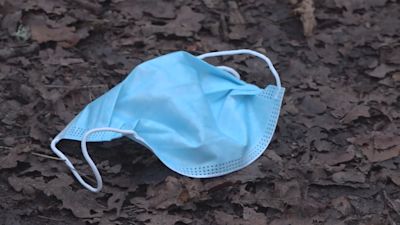'Environmental disaster looming' with 91 times more face mask litter, say researchers in Portsmouth

There were 91 times more litter from face masks recorded in the first seven months of the pandemic, creating plastic pollution which could last hundred of years and potentially increasing the spread of coronavirus.
That's according to a new study from the University of Portsmouth. Researchers are urging the Government to launch legislation to prevent PPE littering after two million items were collected across 11 countries.
They warn that face masks can act as a vector to spread Covid-19 and cause infrastructure problems such as blocking sewers.
Face masks can also pose a threat to animals as they can choke on them or suffer problems if the masks are eaten. They can also damage plant life.
In the long-term, the researchers at Portsmouth are warning that dropped face masks can help transmit pollutants as well as becoming micro plastics that enter the food chain.
Lead researcher Dr Keiron Roberts said: "There is a clear need to ensure that requiring the use of these items is accompanied with education campaigns to limit their release into the environment."
"All those anecdotal accounts we were seeing last year over in South east Asia, with masks washing up on beaches in Hong Kong, all the way through to late May where we were seeing more reports of more masks than jellyfish in the Mediterranean Ocean were actually true.
"It wasn't just some random phenomenon, it was being caused by different actions of governments and people.
"At the beginning of last year, what happened in March came as a surprise to most people. The until June we were in relative lockdown, and as we came out of lockdown, we were encouraged and then required to use masks.
Lead researcher Dr Keiron Roberts
"What we noticed as researchers is, during that interim period where we couldn't go out, we began to see all this litter appearing.
"We searched around for ways in which we could do some research on this, and one of the best methods, was this Citizens Science application, where people were going out litter picking during their free time to exercise, and they were recording what they were capturing.
"This was happening well before the pandemic, so we could see the data and see where masks and gloves and sometimes wipes were appearing."
Professor Steve Fletcher added: "Despite millions of people being told to use face masks, little guidance was given on how to dispose of them or recycle them safely. Without better disposal practices, an environmental disaster is looming.
"The majority of masks are manufactured from long-lasting plastic materials, and if discarded can persist in the environment for decades to hundreds of years. This means they can have a number of impacts on the environment and people."